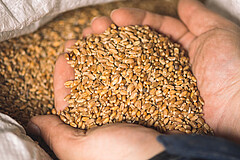Wheat: Good baking results despite reduced nitrogen fertilization [16.08.22]
A new heavily funded research area at the University of Hohenheim looks at the relationship between nitrogen fertilization, protein content, and the baking properties of bread wheat. The goal here is to obtain an optimum baking result by combining the right choice of cultivars and ideal nitrogen supply, while reducing nitrogen at the same time. The German Research Foundation (DFG) is funding Dr. Markus Dier's project at the Department of Quality of Plant Products (Prof. Dr. Christian Zörb) to the tune of approximately EUR 365,000.
Bread volume mainly depends on the proteins in the flour – both the total protein content and its composition play a role. They are both influenced by the type of wheat used, fertilization, and the location of the plants. In cultivation practice, the protein content of a wheat kernel is considered the most important characteristic for assessing the baking quality of bread wheat.
To achieve the highest possible protein content, farmers frequently apply large amounts of nitrogen fertilizer. Often, fertilizer is also applied late in the year, just before harvest. However, this can lead to increased environmental pollution if too much nitrogen is released unused into the environment.
In the case of modern wheat cultivars, however, baking volume might be influenced less by protein content than by its composition. For example, there are significant differences in baking volume between cultivars that have the same protein concentration. In addition, there are cultivars where the protein content and baking volume are not directly related, whereas others have a linear relationship – the more protein they contain, the greater the baking volume.
In this project the researchers want to investigate the reasons behind this. To this end, they plan to study nine wheat cultivars that exhibit different baking properties in a two-year field trial. They will vary nitrogen administration from a deficiency level to excessive supply.
Among other things, the researchers are interested in how nitrogen fertilization changes protein content and its composition. Which of these changes cause dough to rise better or less well? Is the increase in baking volume essentially a result of the change in protein composition?
They also want to investigate how to reduce fertilization with nitrogen without loss of yield and baking volume, thereby increasing nitrogen use efficiency.
Project details
- Title: Basic analysis of wheat grain quality in terms of improving nitrogen use efficiency
- Funding amount: EUR 364,283
- Funding institution: German Research Foundation (DFG)
- Project duration: 1 September 2022-31 August 2025
Contact
Dr. Markus Dier, University of Hohenheim, Department of Quality of Plant Products,
+49 711 459-22433, markus.dier@uni-hohenheim.de
Prof. Dr. Christian Zörb, University of Hohenheim, Department of Quality of Plant Products,
+49 711 459-22520, christian.zoerb@uni-hohenheim.de
Heavyweights of research
The series “Heavyweights of Research" presents outstanding research projects with a financial volume of at least 350,000 euros for research requiring equipment or 150,000 euros for research without specialized equipment.


